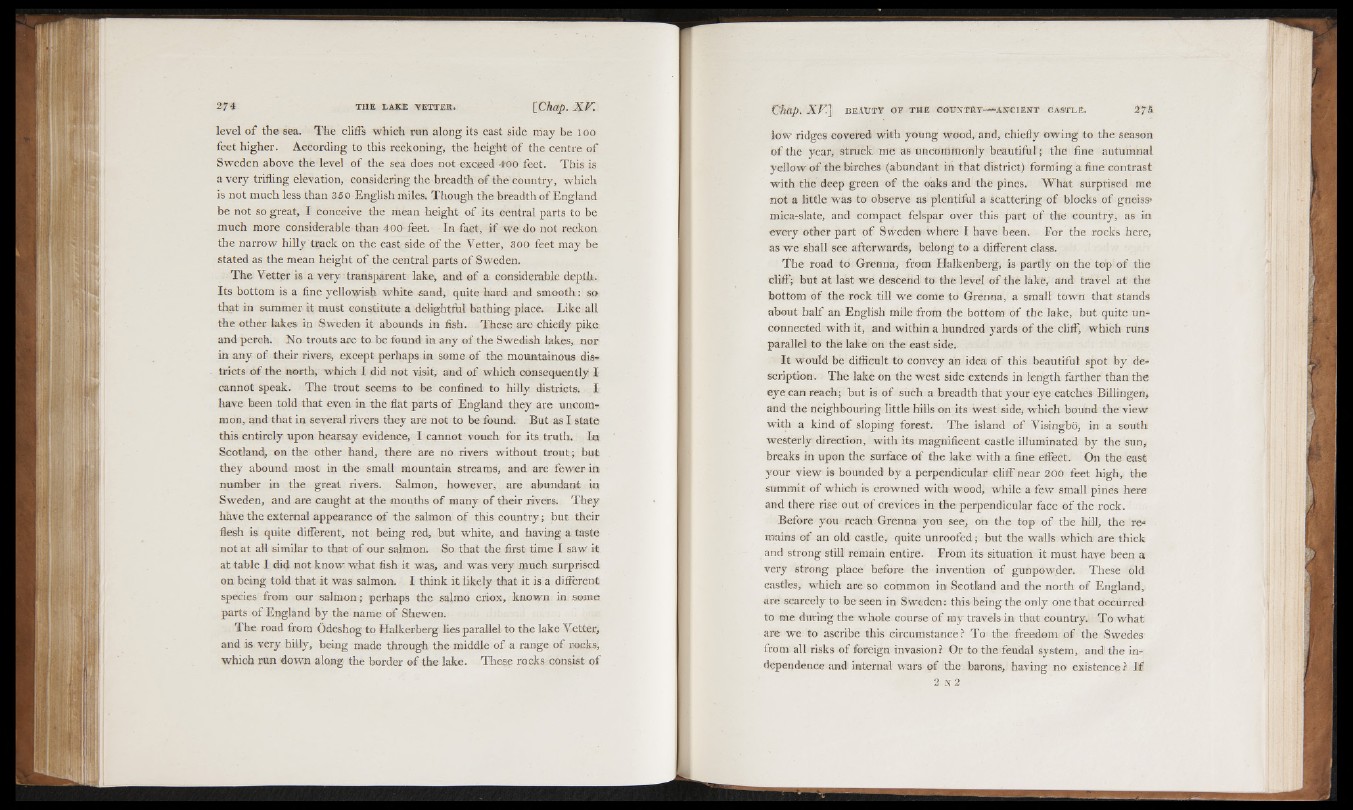
level o f the sea. The cliffs which run along its east side may be loo
feet higher. According to this reckoning, the height o f the centre o f
Sweden above the level o f the sea does not exceed 400 feet. This is
a very trifling elevation, considering the breadth o f the country, which
is not much less than 360 English miles. Though the breadth o f England
be not so great, I conceive the mean height o f its central parts to be
much more considerable than 400 feet. In fact, i f we do not reckon
the narrow hilly track on the east side o f the Yetter, 3oo feet may be
stated as the mean height o f the central parts o f Sweden.
The Yetter is a very transparent lake, and o f a considerable depth.
Its bottom is a fine yellowish white sand, quite hard and smooth: so
that in summer it must constitute a delightful bathing place. Like all
the other lakes in Sweden it abounds in fish. These are chiefly pike
and perch. No trouts are to be found in any o f the Swedish lakes, nor
in any o f their rivers, except perhaps in some o f the mountainous dis»
tricts o f the north, which I did not visit, and o f which consequently I
cannot speak. The trout seems to ba confined to hilly districts, I
have been told that even in the flat parts o f England they are uncommon,
and that in several rivers they are not to be found. But as I state
this entirely upon hearsay evidence, I cannot vouch for its truth. l a
Scotland, on the other hand, there are no rivers without trout; but
they abound most in the small mountain streams, and axe fewer in
number in the great rivers. Salmon, however, are abundant in
Sweden, and are caught at the mouths o f many o f tbeir rivers. They
have the external appearance o f the salmon o f this country; but their
flesh is quite different, not being red, but white, and having a taste
not at all similar to that of our salmon. So that the first time I saw it
at table I did not know what fish it was, and was very much surprised
on being told that it was salmon. I think it likely that it is a different
species from our salmon; perhaps the salnoo eriox, known in sonae
parts of England by the name o f Shewen.
The road from Qdeshog to Halkerberg lies parallel to the lake Yetter,
and is very hilly, being made through the middle o f a range o f rocks,
which run down along the border o f the lake. These rocks consist o f
low ridges covered with young wood, and, chiefly owing to the season
o f the year, struck me as uncommonly beautiful; the fine autumnal
yellow o f the birches (abundant in that district) forming a fine contrast
with the deep green o f the oaks and the pines. What surprised me
not a little was to observe as plentiful a scattering o f blocks o f gneiss>
mica-slate, and compact felspar over this part o f the country, as in
every other part o f Sweden where I have been. For the rocks here,
as we shall see afterwards, belong to a different class.
The road to Grenna, from Halkenberg, is partly on the top o f the
cliff; but at last we descend to the level o f the lake, and travel at the
bottom o f the rock till we come to Grenna, a small town that stands
about half an English mile from the bottom o f the lake, but quite unconnected
with it, and within a hundred yards o f the cliff, which runs
parallel to the lake on the east side.
I t would be difficult to convey an idea o f this beautiful spot by description.
The lake on the west side extends in length farther than the
eye can reach; but is o f such a breadth that your eye catches Billingen,
and the neighbouring little hills on its west side, which bound the view
with a kind o f sloping forest. The island o f Visingbd, in a south
westerly direction, with its magnificent castle illuminated by the sun,
breaks in upon the surface o f the lake with a fine effect. On the east
your view is bounded by a perpendicular cliff near 200 feet high, the
summit o f which is crowned with wood, while a few small pines here
and there rise out o f crevices in the perpendicular face o f the rock.
Before you reach Grenna you see, on the top o f the hill, the remains
o f an old castle, quite unroofed; but the walls which are thick
and strong still remain entire. From its situation it must have been a
very strong place before the invention o f gunpowder. These old
castles, which are so common in Scotland and the north of Engloa nd, ~
are scarcely to be seen in Sweden: this being the only one that occurred
to me during the whole course o f my travels in that country. T o what
are we to ascribe this circumstance? T o the freedom o f the Swedes
from all risks of foreign invasion? Or to the feudal system, and the independence
and internal wars of the barons, having no existence? If
2 S 2